A couple evenings ago, while
heading from my office down to the kitchen, once again I took the
top step just a little bit off, missed hitting the second step perfect by
just a bit more, and on the third step found myself sliding "down
the chute" once again. With such narrow, steep
stairs, this seems this to happen every year or
two, but the damage this time was the worst in my experience.
(May 20, 2007)
"The Chute" looking down
|
Problem One is the hallway the steps run
between is extremely narrow; just a couple inches wider than my
shoulders -- no handrails, just a wall on each side. From
whacking my elbows so often going downstairs, I've learned to
twist my torso, lead with my right shoulder, left arm sort of
protected behind me. The wall-to-wall carpeting had become
somewhat worn on the edges where my feet rub, making them
more slippery.
Problem Two is the steps are steep, the
treaders short, the risers high. They had to be to get from the
second floor down to the kitchen in the space available.
Barbara suggested that I have them extended further out, so I
could have wider treaders, shorter risers, less height/steepness
-- but then I'd run into . . .
Problem Three: At the fourth from
the bottom step I must duck beneath the kitchen ceiling -- or whack my
head. I did that a few times going down when I first
moved in about ten years ago. I learned to duck, done almost
automatically since. When I've slipped down those steps, my biggest concern was/is keeping my head down
-- "riding it out" instead. But the
steps have to be steep to get beneath that ceiling. The old guy
who formerly owned the house -- originally a small summer camp -- who did most of the additions to it
over many years, had to make a lot of compromises when he
added the second floor and put in this stairway.
Problem Four: There's nothing to grab if I start to
lose footing, start sliding. With but 2-3 inches of
wall on each side of my shoulders, it means I'm "riding the
chute" to the bottom -- unless I hook a step on the way down
with my trailing elbow, use my arms like brake shoes against
the "brake drum" walls, or can grab the rail at the bottom
before hitting the kitchen floor.
I'm up and down those stairs probably three
or four dozen times a day anyway. My office, bedroom, and
primary bathroom and shower are on the second floor. For a
while after the latest slip-and-fall, I'm real careful -- but
after a while
I'm inevitably back to auto-pilot, taking the stairs without thinking.
I warn everyone who comes up or down to be
real careful of those steps. Barbara will come upstairs only if
there's no avoiding it, and then very carefully. At least so
far I've been the only one to ride the chute down or to bang my
head!
The trick is to step off the second floor
hallway landing exactly right, on the right foot with toes about
three inches over the edge. The left foot then lands on the
next step, sort of duck-walking splay-footed with toes pointed
outward about three inches over the edge, heel against the riser, and so forth the rest
of the way down. Duck my head approaching the bottom beneath the ceiling.
That first step off the landing is critical for hitting the
second step precisely. If I over- or under-shoot that second
step with forward and downward momentum, I hit the third step
way off and recovery is near-impossible (even as that kitchen
ceiling approaches). This time, I believe my heel hit the
second step's riser, pushing my third step too far ahead and
launching me (for my fourth or fifth ride down the chute).
As I went down, I initially made contact with my (trailing)
left forearm (carpet burn bruise) then elbow (cut,
black-and-blue), then ended up at the bottom. I was hurting,
but nothing like what was to come. When I came back up to my
office after locking up the house for the night I knew I was going to have general aches and pains come
morning, but was surprised I didn't have more pain in my left elbow,
which once again took the brunt of the fall, or so I thought.
After a night and day of
pain, I went to an orthopedic doctor to be checked
out. His x-rays showed a broken left clavicle and a broken
left rib!
Apparently the force from my forearm/elbow
was transmitted up through my shoulder, breaking the clavicle
(part of the acromion process, which -- as I recall from my biology
class days of yesteryear -- holds the shoulder together
along with the shoulder blade, upper arm bone, and a bunch of
tendons, ligaments, and muscles); I must have hit my ribs on
the slide down the stairs, or the broken rib and overall pulled
rib muscles were part of the elbow-shoulder chain reaction.
My chest is again wrapped with the familiar
Ace bandage of last year's cruise.
The Tylenol 3 (with codeine) he prescribed
works a little better than over-the-counter Tylenol,
but the pain remains quite intense. The "figure eight shoulder
harness" he
put me in is intended to keep my shoulders held back
(reminds me of standing at attention while I was in the Army!)
so the clavicle can heal. The option was a sling, but that
would have immobilized my left arm and hand -- and I wouldn't
have been able to type! I knew I bought a wireless keyboard
years back for a reason: it's now sitting on my lap as I
type,
still uncomfortable but doable! Six weeks to heal, I was told --
but I wonder how long before the worst of the pain subsides?
The doc told me if I try to overdo or rush it, the clavicle
won't heal and he'll have to operate, put in some sort of
plate -- that I can definitely do without! He wants me
to also keep an eye on my breathing, to breath deeply (ouch) --
there's a potential for pneumonia with this type of injury, he
advised. Wonderful.
What a great way to start off Sailing
Season '07. Oh well, accidents happen, and I guess this beats
tearing rib muscles on the first day out on my cruise, as I did
last summer, and carrying on singlehanded and in pain for two
weeks. At least I could tough that out: there's no way
I could pull that off with this damage and pain. It's rather
intimidating to consider just how fragile our bodies are. To
think, I almost didn't go to the doctor -- thought "this too
shall pass," until I saw the x-rays.
|
Marshall, the boatyard carpenter, came by on
Thursday and began improving the stairway. First
he tore out the old wall-to-wall carpeting. (That
alone I suspect cured most of the slip-and-slide problem!)
Next he replaced it with the 13 non-skid rubber stair
treads I'd found and bought on the Internet from The Vermont Country
Store, gluing each down with contact cement, then
stapling them, and finally tacking down the trim pieces.
He'll be back to install handrails blocking and coming
down from the top of the stairway as soon as he gets
them together. What a difference this makes
already, positive
traction! (Jun. 1, 2007)
|
|
Click thumbnails below for
enlargements |
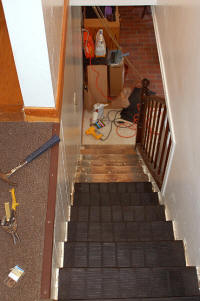 |
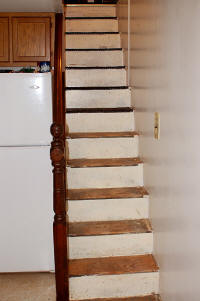 |
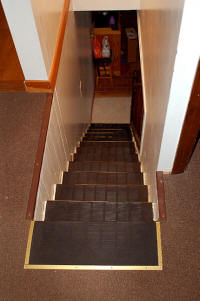 |
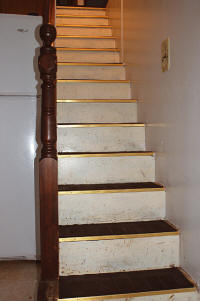 |
 |
|
|
Phase
II |
Marshall was back yesterday with the new handrail and
banister, now installed. What a difference this makes
-- it's going to be almost hard to ever fall down these
stairs again!
When the doc told me it'd be six weeks of recovery, I
asked "What about my boat? I'm almost ready
to launch. When can I get back to work
on it?"
"Screw your boat, Chip" he replied. "Fix those damn
stairs!" So now they are fixed.
I called the doc this week and said I was feeling better
even with the shoulder harness and Ace bandage removed;
no more pain, no pain-killers for over a week. I
asked if I could get back to work, even light work.
Murray advised: "No pushing, no pulling, no
lifting."
I replied, "That doesn't leave much . .
. " With a grin I couldn't see on the other end of
the line, I heard, "Now you're getting it, buddy.
Two more weeks." (Jun. 24, 2007)
|
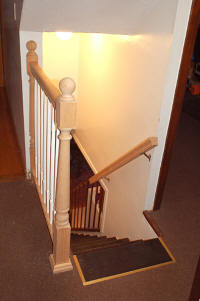 |
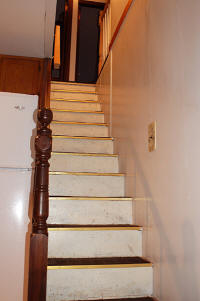 |
|
|